Gratitude

Japan is a land of extremes. While the Japanese are best known for their wacky (Symbol) or extreme (Grotesque) cinema, there's also plenty of room for subtle, stilted and human drama. Jun Ichikawa is without a doubt one of the masters of the genre, sadly his strengths are hardly recognized outside of Japan. Time to change that, so I tracked down one of his more recent films and wasn't disappointed. Gratitude [Aogeba Totoshi] turned out to be a neat little gem.

Ichikawa started his career in 1987 but it wasn't until he directed Toni Takitani in 2004 that the world took notice. Not because Ichikawa had all of a sudden accomplished a stunning masterpiece, but because the short story it was based on was written by Haruki Murakami, probably Japan's most famous contemporary novelist. With that in mind Ichikawa's relapse was to be expected and he quickly faded back into anonymity after the buzz around Toni had died out. The sad reality of being a relatively unknown foreign director.
Popularity is never a good indicator of quality though, so don't be put off if you've never heard of Ichikawa before. He has a way with subtle, small dramas that's quite unique, Gratitude is no exception to the rule. It usually takes a while to get immersed into his films as most of what is happening on screen is quite mundane and uneventful, but throughout his movies quality bonds with the characters are formed and when the end credits start to roll there's always a sadness leaving the characters behind.
Gratitude is a film about mourning and coping with loss. Koichi is a school teacher whose father gets diagnosed with a lethal disease. His father will be spending his last months at Koichi's home as suddenly one of his students is developing a somewhat unhealthy fascination with death. Somewhat at a loss at how to deal with this, Koichi decides to use his father (once a teacher himself) as class material for his students in order to teach them a little about death, loss and mourning.

Like many of its peers Ichikawa loves to stylize using mostly grey and blue color overtones. The visuals are never grand or impressive but Ichikawa does manage to sneak in some atmosphere shots. Smoke, skies and parks are used as nice little breathers in between the human drama. A little extra detail to the camera work could've elevated to film to a higher level, but as is the visuals work well enough.
Ichikawa's secret weapon is definitely the soundtrack. While at first not terribly special or exciting, the score is simply stunning and flows incredibly well with the rest of the film. Subtle violin music that has a calming and relaxing effect while at the same time injecting the film with some extra dramatic tension. Luckily the soundtrack is never overused and never becomes bombastic as that would've killed the mood for sure.
The actors are solid and natural. The cross-eyed Terry Ito is quite a character but living proof that looks don't affect good acting skills. Some gentle humor even disguises his physical particularities. The rest of the cast is equally strong which is quite an accomplishment considering there is at least one child actor with quite some screen time. Drawing the best from the actors is a key feat of a director doing drama and Ichikawa is definitely a pro.

While the subject sounds a little morbid on paper it is incorporated in a very human and non-populist manner. It might sound a little strange for a teacher to encourage his class to visit his dying father but this is aptly countered by the fact that his father was once a teacher himself, accentuating their idealism to teach something to these kids, even to the point of using oneself as a subject for teaching.
It takes a good half hour to sink into the film. It's a typical Japanese drama in the sense that its characters are pretty introvert and the drama itself is handled in a very mannered, serene way, so if that's not to your fancy it is probably best to avoid this film altogether. The soundtrack and visuals wrap themselves around the audience like a warm blanket while the drama slowly unfolds and runs its course. Fans of the genre will feel right at home though and can warm themselves to this little gem. Jun Ichikawa, remember that name.